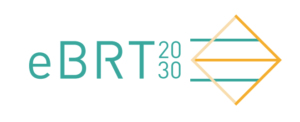Electric Bus Rapid Transit 2030
Context
The last five years have seen a rapid expansion of Zero Emission Buses in the European Union. From the very first pilots in Europe towards grand scale implementation in various countries: the ZE Bus market has matured rapidly. In the Netherlands without a doubt the National Agreement (BAZEB) has contributed to this growth. Besides a clear political ambition, economic incentives have also contributed: in contracts lasting at least 15 years: battery-electric buses would outrun their diesel equivalents in terms of operating costs overcoming the higher investment costs.
Another gamechanger for Public Transport is the development of Bus Rapid Transit systems. A system with vehicles large enough to accommodate for large groups of travellers, without the infrastructural complexity and maintenance costs of rail bound systems.
Project brief
In the eBRT2030 project a consortium of 45 international partners work together on a new system which combines the latest battery ZE Bus technologies with the newest developments on Bus Rapid Transit systems. The idea is to develop a system of systems that can be replicated in other European cities and other parts of the world.
Objectives
The eBRT2030 project will create a New Generation of advanced full electric, urban and peri-urban European Bus Rapid Transit (BRT) enhanced with novel automation and connectivity functionalities, to support sustainable urban transport by reducing cost/km/ passenger, TCO, GHG and pollutant emissions and traffic congestion. The eBRT2030 project is developed through three main lines:
- The development of technology-focused key innovative solutions for BRT, both at system and subsystem level, at level of vehicle, infrastructure, operation, and IoT connectivity
- 7 demos of BRT system innovative solutions in real-operation, both city- and operator-led and BRT system-focused, or focused on specific technology innovation at subsystem level that are ready for BRT operations, in Europe and outside Europe (in Latin America and East-Africa), and fully integrated in the whole urban mobility scenario
- The definition of a new European concept of Bus Rapid Transit for year 2030, benefitting of evaluation, multiplication and replication of the real-operation test of innovations, that improve the performance of the whole European urban bus system. All cities in eBRT2030 already have BRT lines in operation or will be launched within 2023, and strongly committed to innovate with electrification, automation, connectivity technology tailored to the characteristics of European bus operations
Cenex NL key contributions
Cenex NL takes the lead to develop a global evaluation framework and an impact assessment model. We will also write a report on an operational tool with TCO, LCA and socio-economic optimization. Once the demonstration projects have taken place, we will produce a local assessment of the individual eBRT demonstrators. The global assessment and lesson learnt that will be produced are to be used to create a replication strategy.
Cenex NL will also play a role in creating technical training material that can be used by others to implement eBRT systems. We will contribute to delivering these trainings, to disseminating knowledge and will actively communicate about the learnings of this project.




